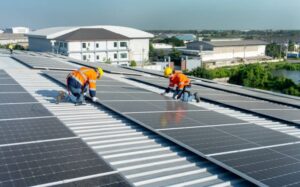As the world changes towards renewable energy sources to combat climate change and ensure energy security, solar power stands out as a head in the race towards sustainability. Within the realm of solar energy, the concept of durable solar panels is emerging as a critical player, promising enhanced longevity, resilience, and efficiency. In this article, we delve into the importance of durable solar panels coming from companies like Tindo solar companies in Adelaide, their advantages, and the technological innovations driving their development.
Understanding Durable Solar Panels:
 Durable solar panels, also known as long-lasting or robust solar panels, are designed to withstand harsh environmental conditions and maintain optimal performance over an extended lifespan. Traditional solar panels typically come with warranties ranging from 20 to 25 years, but durable panels aim to exceed these expectations, offering warranties of 30 years or more. Achieving durability involves advancements in materials science, engineering design, and manufacturing processes to enhance resilience and reliability.
Durable solar panels, also known as long-lasting or robust solar panels, are designed to withstand harsh environmental conditions and maintain optimal performance over an extended lifespan. Traditional solar panels typically come with warranties ranging from 20 to 25 years, but durable panels aim to exceed these expectations, offering warranties of 30 years or more. Achieving durability involves advancements in materials science, engineering design, and manufacturing processes to enhance resilience and reliability.
Advantages of Durable Solar Panels:
- Extended Lifespan: The primary advantage of durable solar panels is their extended lifespan. By incorporating robust materials and construction techniques, these panels can withstand wear and tear from weather, temperature variations, and other environmental factors, ensuring reliable performance over several decades. This longevity maximises the return on investment for solar installations and reduces the need for frequent replacements, lowering overall lifecycle costs.
- Enhanced Performance: Durable solar panels often boast superior performance characteristics compared to conventional panels. Advanced encapsulation materials and anti-reflective coatings minimise degradation caused by UV exposure and improve light absorption, resulting in higher energy yields over time. Additionally, enhanced durability reduces the risk of microcracks, hot spots, and other issues that can compromise panel efficiency, ensuring consistent power output throughout the lifespan of the system.
- Resilience to Extreme Conditions: Durable solar panels coming from companies like Tindo solar companies Adelaide are engineered to withstand a wide range of environmental conditions, including extreme temperatures, high winds, hailstorms, and snow loads. Reinforced frame structures, tempered glass surfaces, and corrosion-resistant components enhance durability and protect against physical damage, ensuring uninterrupted operation even in challenging climates. This resilience makes durable panels ideal for installations in regions prone to severe weather events or environmental hazards.
- Improved Sustainability: By extending the lifespan of solar panels and reducing the frequency of replacements, durable panels contribute to enhanced sustainability and resource efficiency. Longer-lasting solar installations require fewer raw materials, energy inputs, and manufacturing processes over time, resulting in lower environmental impact and carbon emissions. Additionally, the longevity of durable panels reduces the accumulation of electronic waste, promoting a circular economy and minimising disposal-related ecological hazards.
Technological Innovations Driving Durability:
- Advanced Materials: The development of high-performance materials plays a decisive role in enhancing the durability of solar panels. Engineers are exploring novel encapsulants, back sheet materials, and protective coatings that offer superior weather resistance, UV stability, and mechanical strength. For example, fluoropolymer-based encapsulants and scratch-resistant glass surfaces improve long-term reliability and durability.
- Robust Design: Engineering design principles are employed to optimise the structural integrity and durability of solar panels. Reinforced frame designs, double-glass configurations, and innovative interconnection methods enhance mechanical stability and resistance to environmental stressors. Furthermore, advanced simulation and testing techniques allow manufacturers to evaluate panel performance under various conditions and identify potential vulnerabilities before deployment.
- Quality Assurance: Stringent quality control measures and standardised testing protocols ensure the reliability and durability of solar panels throughout the manufacturing process. Manufacturers implement rigorous testing procedures, including thermal cycling, humidity exposure, and accelerated aging tests, to assess product performance and verify compliance with industry standards. Additionally, certifications such as the International Electrotechnical Commission (IEC) standards provide third-party validation of panel durability and reliability.
- Continuous Improvement: The pursuit of durability is an ongoing process, with manufacturers continuously innovating and refining solar panel technologies to enhance performance and longevity. Research initiatives focus on materials science, manufacturing techniques, and system integration to address emerging challenges and push the boundaries of durability. Collaborative efforts between industry stakeholders, research institutions, and government agencies drive innovation and accelerate the adoption of durable solar panels.
Durable solar panels coming from companies like Tindo solar companies Adelaide represent a significant advancement in renewable energy technology, offering enhanced longevity, performance, and resilience compared to traditional panels. By leveraging advanced materials, robust design principles, and rigorous quality assurance measures, manufacturers are pushing the boundaries of durability and reliability in solar panel technology. As the demand for clean, sustainable energy continues to grow; durable solar panels will play a pivotal role in powering the transition towards a greener and more resilient future. Investing in durable solar panels not only maximises the environmental and economic benefits of solar energy but also ensures a sustainable energy infrastructure for generations to come.